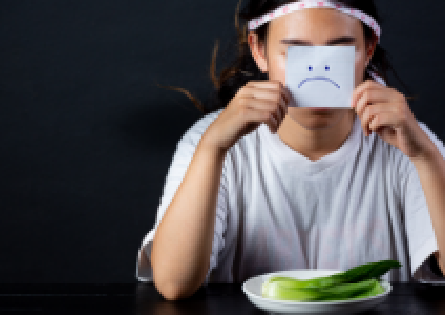Posted on March 06, 2021
Nothing is unusual, I think, as my legs monotonously drag themselves towards the classroom. Not a single thing is out of routine. The laughter, mundane talks that never cease to fill the corridors, glances at the latecomers… everything is the same. However, everything won’t be the same after today. Carrying a guilty heart, I look for them. Where are they? Haven’t they come? Just before I can get panicky I spot them arguing over something. I take slow steps thinking about the best way to break the news. I start smiling in anticipation over their reactions.
‘Hi guys’ I say in a grave voice.
They greet me in their usual manner.
‘I have something to tell you. Something, I have been keeping from you.’ I keep my voice low to keep it out of the range of any eavesdroppers.
‘Guys,’ I take a deep breath ‘I am a type-1 diabetic.’ Their reactions are none of what I expected. No shock, no sympathy, no sign of betrayal, no bewilderment. Plain curiosity.
As a diabetic one has to face many challenges. One of them is gaining social acceptance. Bitter as it may sound, it is true that India continues to be a country where the word ‘diabetes’ is flinched from. Not surprisingly, it was decided immediately after my diagnosis that my illness would be kept a tightly guarded secret. Owing to it, not more than six or seven people (including my parents) knew about it even after five years of the diagnosis. Telling relatives or classmates was a big NO.
Finally, when I entered tenth grade I decided to go against my parents and confided to my whole group about my health problem, a detailed account of which has been written earlier. My act was revolutionary, to say the least. And very surprisingly my parents approved of it (may be because they had no choice).
My friends were ‘curious’. They asked me all sorts of things- how did I take injections? How did I manage my sugar levels? What would I do if my sugar levels were low…amazingly, one of my friends was so curious that she did a whole research on diabetes and ended up knowing way more than me. Little did I know that her research work would come very handy in one of my most disastrous days in school.
‘Are you okay?’ I can barely make out Shubhangi’s voice as my whole focus is on the shaking of my limbs. She is sitting right next to me.
‘I will be fine in ten minutes.’ I try to reassure her cursing the fact that she knows almost everything about an attack of hypoglycemia and its consequences if it isn’t controlled. Two toffees should be enough, I tell my mind. They aren’t, I find out after ten minutes.
‘That’s it. You are going to the medical room, right now.’ She hisses as her uneasiness grows. The rest of my friends are completely unaware of the conversation.
‘I don’t want to create a scene.’ I try to infuse some fury into my voice. Being a smart girl, she understands the point. She takes out a slip of paper and scribbles something on it. The slip is circulated around the entire class going totally unnoticed by the teacher. I want to ask her what the hell she is doing but don’t have the energy to. Ten minutes to recess, come on Kushagra, just ten minutes! I realize that I am pathetic in the self-motivation department.
‘Here you go!’ she hands the slip to me.
‘Wha…’ ‘Just open it’ she orders and smiles as if she has conquered something. Her smile adds to the thrill of opening the slip that has just completed one full round of the class.
I am totally bewildered to find broken pieces of chocolate and toffees and candies in it. I quickly throw two candies in my mouth and let them melt there. Below all the sweet dishes I find something written. It says
‘Hey, anyone with candies or chocolate? I am dying here. Please contribute. – The chocoholic – Shubhangi
I return to normalcy after two to three minutes. And feel very fortunate to have such friends with me. Sometimes I wonder what would have happened had she not been there.
‘Could you please not freak out and do what I have asked you to do?’ I spit the words at Ashutosh who seems visibly shell-shocked at seeing me inject insulin into my body. Well, he asked for it. Actually, it was a deal. He would guard the washroom until I took the injection if I let him see how I took injections on my own. The bargain worked out well.
‘I am so glad our matches were extended to 5P.M. today.’ His voice is filled with more of excitement now.
‘Seriously, if I had any other choice I wouldn’t have dragged you into it.’ I tell him. You never know with tennis matches. The schedule does go haywire in tennis tournaments. And what was I supposed to do, sitting here in the Vasant Kunj sports complex?
‘Well, I am glad you ran out of options.’ He says and laughs. We would laugh over this incident for years to come.
The two incidents are in stark contrast to the general scenario. Generally, the reaction one receives on telling someone that one is diabetic is of sympathetic sighs, pity-showing faces and awkwardness. To a large extent it (reaction) is true but it also depends upon who you are telling it to. Secrecy is important, given the conservative nature of Indian society, but equally important is confidence. It gets more important if the patient is school going or is in his or her teens.
The decision of confiding to someone about one’s illness is completely personal and depends upon an individual. However, the need is more universal. We all have people in our lives that we can fall back on (apart from family members), people whom we trust, people who we know won’t break that trust. In my opinion, we need to identify those people as they turn out to be the best confidants. Disclosure of your difficulties to those close to you is not only psychologically important but also practically advantageous.
Practically speaking, there should be someone around you who knows what to do in case of an emergency. Consequently, there is a sense of security in you. Subjectively speaking, keeping secrets is not a healthy habit. They crawl back from the deep place where you have buried them and stare at you periodically. One needs to get them out of the darkness and face the truth.
I have never regretted my decision of revealing my illness to any of my friends because they have always been quite cool about it. They have also helped me tackle this problem, the psychological advantage I was talking of. May be I got lucky, some may think. May be, I wouldn’t be saying the same things had I been born in a rural area. May be the people you trust may break it sometime. But then there are a lot of “may be’s” that can’t be answered. Risks are to be taken. Sometimes, they will pay off and sometimes they won’t. But whatever the case is, at least you will break that shell. And believe me, it will more than compensate for the things that would go wrong.



